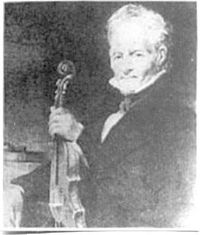Annotation:My Love to-day as heretofore: Difference between revisions
No edit summary |
No edit summary |
||
| Line 3: | Line 3: | ||
<p><font face="garamond, serif" size="4"> | <p><font face="garamond, serif" size="4"> | ||
'''MY LOVE TODAY AS HERETOFORE''' (Mo run an diugh mar an de thu). Scottish, Slow Air (6/8 time). G Major. Standard tuning (fiddle). AABB. Fraser's note accompanying the tune reads: | '''MY LOVE TODAY AS HERETOFORE''' (Mo run an diugh mar an de thu). Scottish, Slow Air (6/8 time). G Major. Standard tuning (fiddle). AABB. Fraser's note accompanying the tune reads: | ||
[[File: | [[File:simonfraser.jpg|200px|thumb|left|Capt. Simon Fraser (1773-1852)]] | ||
<blockquote> | <blockquote> | ||
''This tune has pervaded most of the Highland and the Isles, but its origin seems to have been traced to Appin of Dull, or'' ''Strathtay, where a girl of the name of Cameron was left in circumstances peculiarly distressing by her lover, who went abroad.'' ''Her song describes, most passionately, her affections unlaterably fixed upon him, and, notwithstanding his dereliction of her'' ''in such circumstances, she observes, that to retort or accuse is by no means the way to reclaim misconduct, but that she would'' ''continue to profess 'her love today as heretofore,' that none might suppose her sentiments altered. Sentiments so loveral and''' ''amiable soon spread from hadn to hand, and found their way to her lover, when the youth, contrasting them with the sting in his'' ''own bosom, was so impressed with the insult offered to so much innate virtue, that he soon felt all the force of returning'' ''affection, heightened by esteem for the object of his early attachment, who could so nobly conduct herself, that he returned to'' ''marry her, and they lived in comfort many years.'' | ''This tune has pervaded most of the Highland and the Isles, but its origin seems to have been traced to Appin of Dull, or'' ''Strathtay, where a girl of the name of Cameron was left in circumstances peculiarly distressing by her lover, who went abroad.'' ''Her song describes, most passionately, her affections unlaterably fixed upon him, and, notwithstanding his dereliction of her'' ''in such circumstances, she observes, that to retort or accuse is by no means the way to reclaim misconduct, but that she would'' ''continue to profess 'her love today as heretofore,' that none might suppose her sentiments altered. Sentiments so loveral and''' ''amiable soon spread from hadn to hand, and found their way to her lover, when the youth, contrasting them with the sting in his'' ''own bosom, was so impressed with the insult offered to so much innate virtue, that he soon felt all the force of returning'' ''affection, heightened by esteem for the object of his early attachment, who could so nobly conduct herself, that he returned to'' ''marry her, and they lived in comfort many years.'' | ||
Revision as of 01:53, 14 March 2014
Back to My Love to-day as heretofore
MY LOVE TODAY AS HERETOFORE (Mo run an diugh mar an de thu). Scottish, Slow Air (6/8 time). G Major. Standard tuning (fiddle). AABB. Fraser's note accompanying the tune reads:

This tune has pervaded most of the Highland and the Isles, but its origin seems to have been traced to Appin of Dull, or Strathtay, where a girl of the name of Cameron was left in circumstances peculiarly distressing by her lover, who went abroad. Her song describes, most passionately, her affections unlaterably fixed upon him, and, notwithstanding his dereliction of her in such circumstances, she observes, that to retort or accuse is by no means the way to reclaim misconduct, but that she would continue to profess 'her love today as heretofore,' that none might suppose her sentiments altered. Sentiments so loveral and' amiable soon spread from hadn to hand, and found their way to her lover, when the youth, contrasting them with the sting in his own bosom, was so impressed with the insult offered to so much innate virtue, that he soon felt all the force of returning affection, heightened by esteem for the object of his early attachment, who could so nobly conduct herself, that he returned to marry her, and they lived in comfort many years.
Source for notated version:
Printed sources: Fraser (The Airs and Melodies Peculiar to the Highlands of Scotland and the Isles), 1816/1874; No. 165, p. 67.
Recorded sources:
